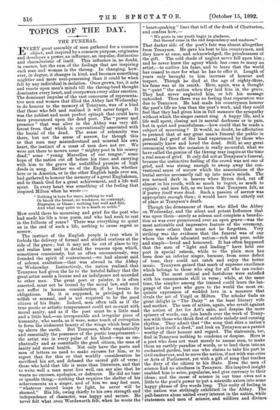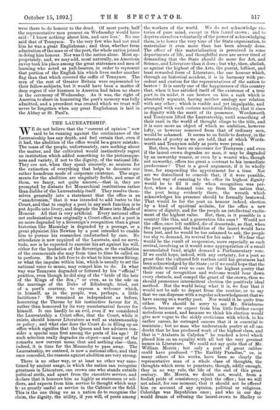TOPICS OF THE DAY.
THE FUNERAL. EVERY great assembly of men gathered for a common object, and inspired by a common purpose, originates and developes a power, an influence, an impulse, distinctive and characteristic of itself. This influence is, no doubt, in essence, but the sum of the feelings that are inspiring each man and woman in the throng. In changing, how- ever, in degree, it changes in kind, and becomes something mightier and more soul-possessing than it could be when felt by any individual in isolation. Once grown, too, it acts and reacts upon men's minds till the throng-bred thought dominates every heart, and overpowers every other emotion. The dominant impulse of the vast concourse of representa- tive men and women that filled the Abbey last Wednesday to do honour to the memory of Tennyson, was of a kind that those who felt and realised it will never forget. It was the noblest and most perfect epitaph that could have been pronounced upon the dead poet. The " power and presence " that was alive in the Abbey was very dif- ferent from that which is conventionally associated with the burial of the dead. The sense of solemnity was there, but not the sense of sorrow, for though this or that man may misunderstand and misread his own heart, the instinct of a mass of men does not err. We were not there to mourn some " mighty poet in his misery dead," some " young Marcellus of our tongue," some hope of the nation cut off before his time, and carrying with him to the grave the unfulfilled promise of high deeds in song. Rather we of the English kin, whether here or in America, or in the other English lands over sea, had gathered to honour the memory of a great Englishman, and to thank God for a great achievement, and a life well spent. In every heart was something of the feeling that inspired Milton when he wrote :— " Nothing is here for tears, nothing to wail Or knock the breast, no weakness, no contempt, Dispraise, or blame ; nothing but well and fair, And what may quiet us in a death so noble."
How could there be mourning and grief for the poet who had made his life a true poem, and who had sunk to rest in the fullness of years ? There was everything to quiet us in the end of such a life, nothing to cause regret or sorrow.
The instinct of the English people is true when it forbids the delivery of formal and studied orations at the side of the grave ; but it may not be out of place to try and realise here and in detail the reasons upon which, sometimes consciously, but as often unconsciously, was founded the spirit of contentment—we had almost said of solemn exaltation—that was abroad in the Abbey on Wednesday. Instinctively, the nation realised that Tennyson had given the lie to the hateful fallacy that the great artist needs a license and an indulgence not accorded to other men. The great poet or painter, it is often asserted, must not be bound by the moral law, and need not suffer in human consideration if be breaks its obligations. He, it is supposed, is privileged to be selfish or sensual, and is not required to be the good citizen of his State. Indeed, men often talk as if the true poetic or artistic temperament could not co-exist with moral sanity, and as if the poet must be a little mad and a little bad,—an irresponsible and irregular piece of humanity, who needs, as it were, some touch of corruption to form the iridescent beauty of the wings which bear him up above the earth. But Tennyson, while emphatically and essentially the possessor of the poetic temperament— the artist was in every pulse of his blood—was as em- phatically and as essentially the good citizen, the man of sanity and moral health. Not only have the poets and men of letters no need to make excuses for him, or to regret that for this or that worldly consideration he sacrificed his art, and debased the sacred gift of verse ; those who hold that life is more than literature, and that to write well a man must live well, can say also that he wants no excuses, apologies, or defences. He did no base or ignoble thing,—nothing that requires the shelter of his achievements as a singer, and of him we may feel sure, " whatever record leaps to light, he never will be shamed." His life, owing chiefly to his own strength and independence of character, was happy and secure. He never felt what even Wordsworth felt, when he wrote the " heart-quaking " lines that tell of the death of Chatterton, and confess how,- " We poets in our youth begin in gladness,
But thereof come in the end despondency and madness."
That darker side of the poet's fate was absent altogether from Tennyson. He gave his best to his countrymen, and they knew at once, and acknowledged, the pricelessness of the gift. The cold shade of neglect never fell upon him ; and he never knew the agony which has come to many an artist,—to outlive his fame, and to learn that the world has ceased to care for what he has to offer it. Length of years only brought to him increase of honour and respect. Though he died at the age of eighty-three, his fame was at its zenith. Here, again, was a thought to " quiet " the nation when they laid him in the grave. They had never neglected him, or left his message unheeded. Thus there was no feeling that reparation was due to Tennyson. He had made his countrymen honour the poet's life no less than the poet's work, and they could feel that they had given him in full measure the sympathy without which the singer cannot sing. A happy life, and a life well spent, closing not in mental darkness or in pain, but in quiet and peacefulness,—how could that be made a, subject of mourning ? It would, no doubt, be affectation to pretend that at any great man's funeral the public in general feel grief of the kind experienced by those who personally knew and loved the dead. Still, at any great ceremonial when the occasion is really mournful, what we have called the genius of the throng may inspire at the time a real sense of grief. It only did not at Tennyson's funeral, because the instinctive feeling of the crowd was not one of grief, and was strong enough to sweep away the con- ventional sense of sorrow which the associations of the burial service necessarily call up into men's minds. The sun seemed dark in heaven when Byron died, cut off almost in his youth, with so much to regret, so much to expiate; and men felt, as we learn that Tennyson felt, as if poetry itself were dead. Such a passion of sorrow was appropriate enough then ; it would have been utterly out of place at Tennyson's death.
Though the demeanour of those who filled the Abbey on Wednesday, and the silent and potent Influence that was upon them—surely as solemn and complete a benedic- tion as was ever pronounced over an open grave—was the most noticeable and impressive feature of the ceremony, there were others that must not be forgotten. Very striking was the evidence that the funeral was of one whom the whole educated nation—rich and poor, noble and simple—loved and honoured. It has often happened that the men of " light and leading" have held one poet in special esteem, while to the plain men has been dear an inferior singer, because, from some defect of tone, they could not catch and enjoy the better music. Tennyson gained that mark of supreme excellence which belongs to those who sing for all who can under- stand. The most critical and fastidious were satisfied with his consummate skill in verse ; while, at the same time, the simpler among the trained could learn the lan- guage of the poet who gave to the world the most ex- quisite expression of wedded love in a measure that rivals the art of Virgil or Milton. The scholar finds as great delight in " The Daisy " as the least literary wife and mother. The men of action, again, who revolt against, the notion of Art for Art's sake, and despise the mere spinner of words, can join hands over the work of Tenny- son with those who think first of subtle melody and cunning rhythm. They admit that "the song that stirs a nation's heart is in itself a deed," and look on Tennyson as a patriot worthy of their honour and regard. The statesmen, too, find in Tennyson nothing to condemn or despise. Here is a poet who does not want merely to amuse men, to make them an earthly paradise of words, or to lead them into an enchanted garden, but one who claims to take his part in civil endeavour, and to serve the nation, if not with war-cries or Acts of Parliament, yet with a gift of song that teaches the duty of the citizen to his State. Even the men of science find no aloofness in Tennyson. His inspired insight enabled him to seize, popularise, and give currency to their ideas ; and the cause of science in our time owes not a little to the poet's power to put a scientific axiom into some happy phrase of five words long. This unity of feeling in the nation was strikingly exhibited in the Abbey. The pall-bearers alone united every interest in the nation, while statesmen and men of science, and soldiers and divines were there to do honour to the dead. Of most poets, half the representative men present on Wednesday would have said : I know nothing about him, and care less.' No one said that of Tennyson. To the very few who had not read him he was a great Englishman ; and thus, whether from admiration of the man or of the poet, the whole nation joined in doing him honour. Nor was it the nation alone. Most ap- propriately, and, we may add, most naturally, an American envoy took his place among the great statesmen and men of learning who acted as pall-bearers, in order to represent that portion of the English kin which lives under another flag than that which covered the coffin of Tennyson. The men of the rest of Greater Britain were represented by their fellow-subjects, but it would have been a matter of deep regret if our kinsmen in America had taken no share in the ceremony of Wednesday. As it was, the right of America to share in honouring the poet's memory was fully admitted, and a precedent was created which we trust will never be forgotten when any great Englishman is laid in the Abbey or St. Paul's.



































 Previous page
Previous page